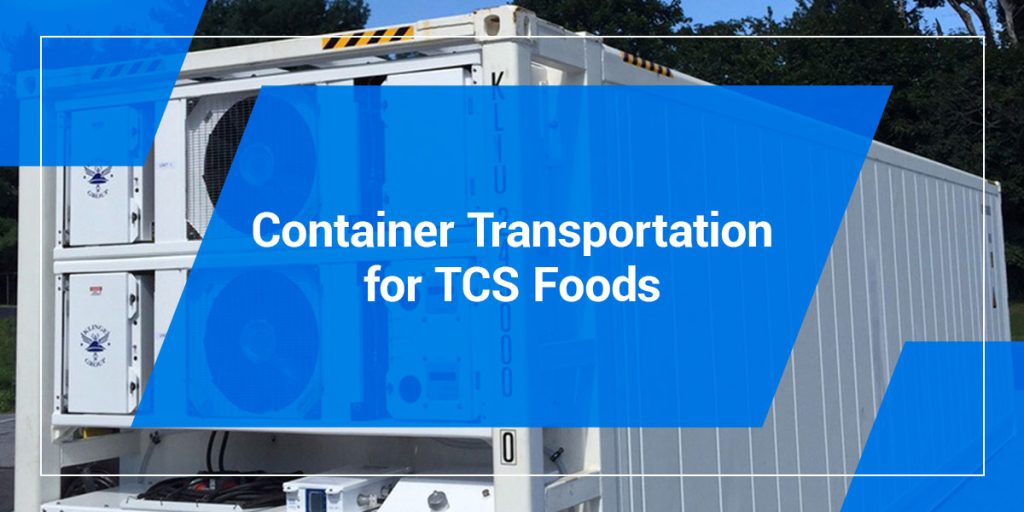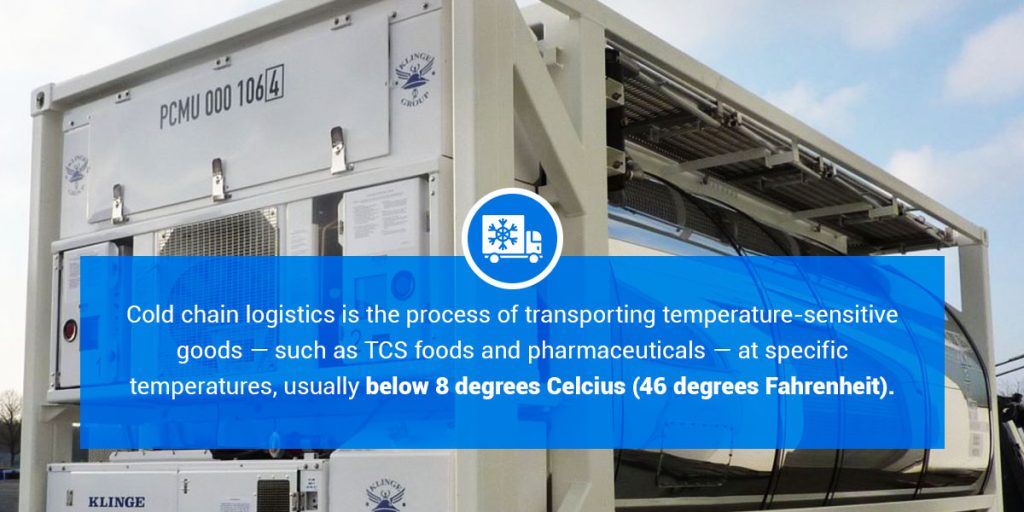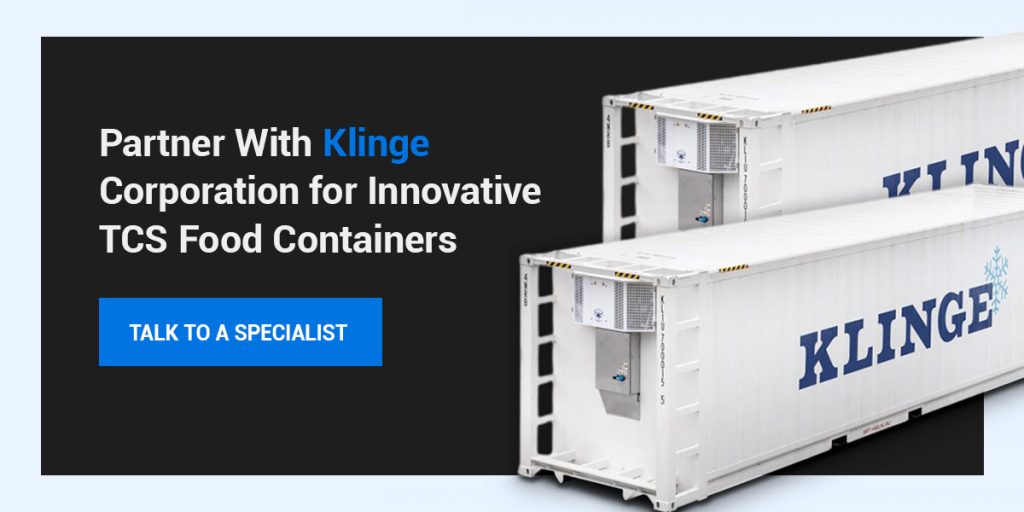Time/Temperature Control for Safety (TCS) foods need extra care and consideration during transportation and storage. Without it, they may spoil and harbor foodborne illnesses, causing damage to consumer health and business operations. The TCS food industry uses specialized containers with refrigeration equipment to keep sensitive foods at the correct temperature. Businesses within this industry must follow strict rules and protocols to provide safe, high-quality food to consumers.
Table of Contents
- What Are TCS Foods
- The Importance of Temperature Control for TCS Foods
- What Is Cold Chain Logistics
- Types of Refrigerated Containers for TCS Foods
- Temperature Monitoring in Cold Chain Logistics
- Food Safety Transportation Regulations
- Partner With Klinge Corporation for Innovative TCS Food Containers
What Are TCS Foods?
Foods labeled with TCS can potentially cause foodborne illness when stored at the incorrect temperature for too long. They are particularly vulnerable to pathogen growth because of their acidity, moisture content and carbohydrate or protein levels.
The most common TCS foods are raw or heat-treated animal products and heat-treated, cut or raw food of plant origin. Examples include meat, fish, milk, cooked rice, raw seed sprouts and sliced tomatoes.
The Importance of Temperature Control for TCS Foods
TCS foods must remain at the specified temperatures to control bacteria growth, making them safe to eat. TCS food regulations also limit how long these foods spend in the temperature “danger zone” between 4 and 60 degrees Celcius (40-140 degrees Fahrenheit). This temperature range creates the perfect conditions for rapid bacteria growth that can make people sick.
Foodborne illnesses resulting from spoiled food include Salmonella, Listeria, Staphylococcus aureus, Campylobacter and Clostridium perfringens. While these often cause mild symptoms, severe cases require hospitalization and can be life-threatening. Aside from illness, TCS consideration is essential to maintain the food’s nutritional benefits. For example, foods like yogurt, kefir and kimchi contain beneficial probiotics and enzymes that may lose effectiveness from incorrect storage.
Temperature control is vital for food industry businesses. Poor food safety can contaminate food, cause irreparable reputation damage and result in fines, business closure and sometimes imprisonment. To avoid negative consequences when transporting TCS food, businesses must have strict, compliant cold chain logistics management procedures.
What Is Cold Chain Logistics?
Cold chain logistics is the process of transporting temperature-sensitive goods — such as TCS foods and pharmaceuticals — at specific temperatures, usually below 8 degrees Celcius (46 degrees Fahrenheit). TCS food manufacturers rely on efficient cold chain logistics with minimal handoffs to maintain the integrity of TCS foods. This is important to comply with regulations, provide consumers with safe products and build a trustworthy brand.
The key components of cold chain logistics include the product, locations and distribution methods. Each component relies on cooling technology to ensure products are in good condition when they arrive at their final destination.
- Product: Each product type requires a specific temperature and humidity throughout the cold chain process. Specialized systems bring the product to the correct temperature, cool products during transit and sometimes thaw them upon arrival.
- Location: Transportation length and locations are essential considerations for cold chain management. Extended trips with multiple handoff points increase the risk of temperature fluctuations, so extra precautions are necessary.
- Distribution: The methods of transport play a significant role in maintaining the correct temperatures during transportation. Most businesses use refrigerated shipping containers — also called reefers — to chill products throughout their journey.
Types of Refrigerated Containers for TCS Foods
The product should inform the reefer type necessary for safe transportation or storage, as each TCS food has specific temperature requirements. At Klinge Corporation, we manufacture various reefers for compliant TCS food transportation:
- Refrigerated units: Our standard, tank and dual refrigerated containers keep food and beverage products at the right temperature.
- Freezer units: Our blast and deep freezer units freeze products like meat and fish at ultra-low temperatures.
- Thawing units: Our thawing units closely monitor and regulate temperature during thawing to reduce drip loss and surface overheating.
Temperature Monitoring in Cold Chain Logistics
Temperature monitoring is an integral part of cold chain logistics. Throughout every stage of the supply chain, temperature sensors and devices must monitor and record product temperature. A centralized system then collects and analyzes this information, compares results against regulatory requirements and alerts handlers of any issues as they occur.
Manufacturers and handlers use various methods to monitor temperature during processing, transportation and storage. Thanks to technology advancements, temperature monitoring is now automated and more reliable than ever. Common methods for monitoring temperature in cold chain logistics include:
- Wireless/remote sensors: Modern temperature sensors automatically record temperature readings and send the information to another system via wireless connectivity such as GSM or Satellite. They allow personnel to see temperature changes in real-time and make necessary changes to correct problems.
- Probes and scanners: Handheld probe thermometers and infrared scanners can measure a product’s internal temperature. These are effective for manual spot checks while moving products to ensure their temperature doesn’t fluctuate.
- Data loggers: Data loggers are essential for extended transit or storage periods. These devices periodically take temperature readings and record them for real-time viewing or save them as historical data. This is important for quality assurance inspections and for analyzing the consistency of transport and storage equipment.
Food Safety Transportation Regulations
The three prominent agencies that control food safety in the United States are the Food and Drug Administration (FDA), the Food Safety and Inspection Service (FSIS) and the Centers for Disease Control and Prevention (CDC). The FDA regulates medicine and food, except for meat, poultry and eggs, which the FSIS oversees. The CDC works to protect the health and safety of American citizens. These agencies create food safety acts and laws to prevent the outbreak of foodborne illnesses.
The law has strict temperature control and sanitation regulations for TCS food manufacturing, transportation and storage. To comply with these regulations, TCS food companies must use compliant reefers, ensure uninterrupted transportation and always maintain safe, consistent temperatures.
There are also regulations specifically for transportation containers. For example, industry regulatory bodies have standards for container size, weight and structure. Other laws require frequent container inspections to ensure they function at maximum efficiency. Handlers must also follow the rules for training, cleaning, timeliness and loading order to prevent contamination. It’s vital for all businesses to understand local, federal and international TCS regulations to stay compliant.
Partner With Klinge Corporation for Innovative TCS Food Containers
Klinge Corporation is the global leader in designing and manufacturing specialized refrigerated containers and equipment. With over 40 years of experience, we help clients find the right cold chain solutions for their needs. Our containers meet stringent ISO standards and feature ultra-reliable temperature control. Additionally, they’re easy to operate and maintain.
Our experienced team can tailor containers to meet your exact design specifications. We pride ourselves on our ability to overcome design challenges, thanks to years of research, testing and engineering. The Food and Beverage Technology Review rewarded our efforts in 2023 by naming us as one of the top 10 food processing solution providers.
Learn more about solutions for food processing and transportation containers online. If you require more information or assistance, please contact us to talk with a specialist. Our team can help you decide and provide a free, no-obligation quote.



